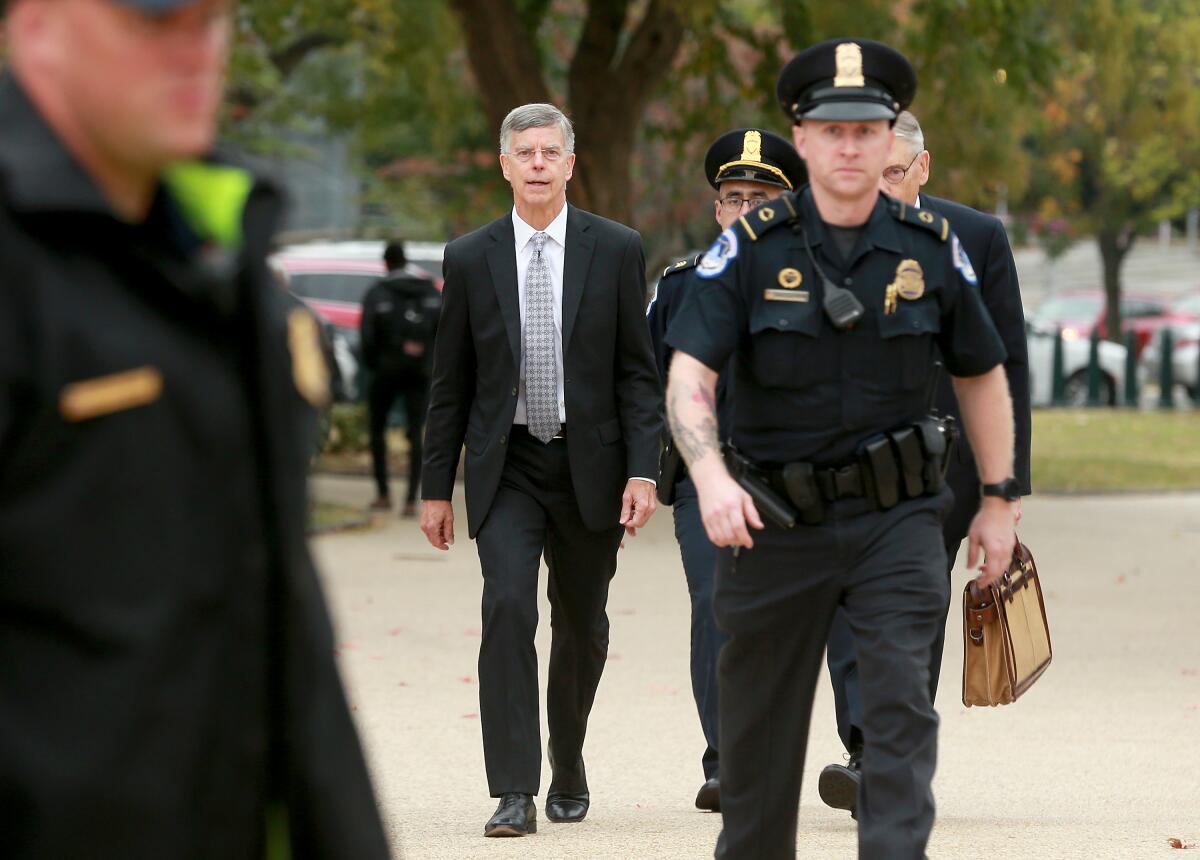Column: Taylor’s testimony causes Trump to push the panic button

- Share via
President Trump ran all the old plays. He said “witch hunt.” He fumed with Sean Hannity. He tweeted “do-nothing Democrats.”
He may have been trying to self-soothe. But it came across as panic.
And the Democrats? “Do-nothing” maybe doesn’t quite nail what they’ve been up to.
First, on Oct. 16, House Speaker Nancy Pelosi went one on one with Trump over his reckless decision to greenlight Turkey’s brutal incursions into Syria. Two days later she published a moving elegy for the Democrat she called the North Star of the House, Maryland Rep. Elijah E. Cummings, who had died Oct. 17.
Next, over the weekend, Pelosi and House Democrats — Adam B. Schiff, Eliot Engel and Bennie Thompson, among others — traveled with Texas Republican Rep. Mac Thornberry to Afghanistan and Jordan to reassure our allies that not all American political leaders have gone mad. Then on Tuesday, she shrugged off jet lag to welcome Hong Kong pro-democracy leaders to the Capitol, voicing support for protests against China’s manifold threats to civil liberties in the region. Finally, late Tuesday, the House Ways and Means Committee approved Pelosi’s drug pricing bill, which Democrats now plan to name in honor of Cummings.
All of this was accomplished, of course, while the House pursued an impeachment witch hunt that, just like the Mueller investigation, keeps turning up cauldrons upon cauldrons of presidential witchcraft.
On Tuesday, the testimony of William B. Taylor Jr., the senior U.S. diplomat in Ukraine, conjured an especially haunting picture of the president in the act of ravaging American interests, security and coffers in favor of his own.
Taylor spoke behind closed doors, but news media obtained his devastating 15-page opening statement and quickly made it public.
There it was, a tick-tock complete with names, dates and references to Taylor’s own contemporaneous memos. It described in vivid detail the attempt of Trump and company to get Ukraine’s president to help manipulate the 2020 election.
Not only did Trump allegedly ask Ukraine to play an illegal role in a U.S. election, his strategy of persuasion looked an awful lot like extortion.
In his statement, Taylor expressed a firm commitment to the long-standing U.S. policy of support for Ukraine against Russian aggression. But then he described a discovery he’d made once he got to Kyiv: A quartet of Trump cronies didn’t seem to share that commitment. And they had created a back channel to gamble with America’s foreign policy.
This “irregular” crew, Taylor testified, included Energy Secretary Rick Perry, Ambassador to the European Union Gordon Sondland, special envoy Kurt Volker and — going nuts on the hurdy-gurdy — the president’s volunteer lawyer Rudolph W. Giuliani.
Steered by these men, U.S. interactions with Ukrainian President Volodymyr Zelensky came to express a tacit threat. The back-channelers had the gall to pressure Ukraine to take the heat for Russian interference in the 2016 U.S. election (urging Ukrainian officials to make a statement about 2016 “potentially in coordination” with Atty. Gen. William Barr, according to Taylor). The men also leaned on Zelensky to investigate — or more precisely to wage a campaign of harassment against — former Vice President Joe Biden and his family.
If Zelensky failed at these tasks, the group implied, his invitation to the White House would be rescinded, according to Taylor’s statement.
And then, military support to Ukraine was on hold. At that moment, Taylor recognized that “one of the key pillars of our strong support for Ukraine was threatened.” The Giuliani-led back channel was working against American foreign policy.
Many Republicans have been pointedly critical of Trump’s actions in Syria. By contrast, their general silence on Ukraine has been deafening.
Kate Brannen, the editorial director of Just Security, has suggested that Republicans such as Sen. Lindsey Graham (R-S.C.) may feel free to take umbrage at Trump’s manhandling of the delicate situation at the Turkey-Syria border because, while it may be unconscionable, it’s within a commander in chief’s powers and not impeachable. It’s also perceived as far less costly with Trump’s base to criticize Syria policy than to condemn Trump for trying to get Ukraine to interfere in American democracy. Because the latter would be impeachable, and Trump and his base want to keep him installed in the White House as long as possible.
Trump is certainly perceived as safest there. On Wednesday, his lawyer claimed in an appeals court that, no joke, if the president were to shoot someone on Fifth Avenue, the cops shouldn’t be allowed to do a thing, because he’s president.
But surely even Trump’s base can’t stay sanguine about his misconduct forever. It simply takes too much self-deception to deny what’s enraging the majority of Americans: not just Trump’s betrayal of America’s allies, but his compulsive betrayal of our own country.
It’s been more than three years since Michael Morell, former acting director of the CIA, warned that Trump as president would act as an “agent of the Russian Federation.” And it’s been three years since, according to a U.S. intelligence report, one pro-Kremlin proxy proclaimed that if Trump became president, “Russia would ‘drink champagne’ in anticipation of being able to advance its positions on Syria and Ukraine.”
Surely champagne corks popped this week at the Kremlin.
Trump’s daily quid pro quos — with foreign leaders, the Republican Party, his own Cabinet — have long been in line with a master quid pro quo, with Russia’s interests.
But the do-everything Democrats in the House have been onto that quid pro quo for a long time. And with each witness who testifies in the impeachment hearings, and now with Taylor’s devastating testimony, they’re filing receipts.
Twitter: @page88
More to Read
A cure for the common opinion
Get thought-provoking perspectives with our weekly newsletter.
You may occasionally receive promotional content from the Los Angeles Times.










